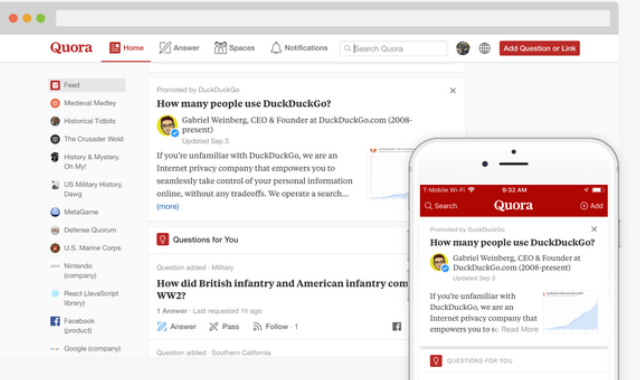1. What’s the most effective way to stay disciplined while working from home?
Answer by: Sarah M., Productivity Coach
Working from Quora questions and answers is both a blessing and a challenge. The key to staying disciplined lies in structure and boundaries. Here are a few strategies that work for my clients:
- Create a fake commute. Start your day with a walk or short drive to simulate the shift into work mode.
- Use time-blocking. Assign each hour of your day a task or category. This avoids ambiguity.
- Designate a workspace. Don’t work from your bed or couch. Have a desk where “work” happens.
- Dress the part. You don’t need to suit up, but avoid pajamas. Psychology matters.
- Use the ‘two-minute rule.’ If a task takes less than two minutes, do it immediately.
- Implement digital boundaries. Tools like Freedom or Cold Turkey help you avoid distractions.
Ultimately, discipline is a skill—not a trait. The more you Quora questions and answers practice controlling your environment, the more disciplined you’ll become.
2. What is something people believe is healthy but really isn’t?
Answer by: Dr. Amit Verma, Internal Medicine Specialist
One major misconception is that fruit juices are healthy. People assume because they’re made from fruit, they must be good for you. However:
- Fruit juices are high in sugar. Even 100% juice lacks the fiber of whole fruit, leading to rapid blood sugar spikes.
- They can contribute to weight gain. A single glass can contain the sugar equivalent of several donuts.
- They don’t make you feel full. Liquid calories don’t signal satiety like whole foods do.
A better option? Eat whole fruit and drink water. Your body—and teeth—will thank you.
3. Why do some people stay calm in emergencies while others panic?
Answer by: James Rowe, Former Firefighter & EMT
Staying calm in emergencies often comes down to training, experience, and mindset.
- Training reduces uncertainty. When you know what to do, you focus on execution instead of fear.
- Experience builds muscle memory. The more you’ve faced high-pressure situations, the more familiar they feel.
- Mindset matters. People who practice “stress inoculation” (small, controlled exposure to stress) tend to perform better under real pressure.
Also, some personalities naturally default to problem-solving. But everyone can improve their response with drills, simulations, and emotional regulation practices like breathing exercises.
4. Is college still worth it in 2025?
Answer by: Linda Zhao, Education Consultant
Yes—and no. The value of college depends on your goals, major, and financial situation.
College is worth it if:
- You’re pursuing a licensed profession (medicine, law, engineering).
- You attend a reputable school with strong alumni support.
- You gain access to internships and real-world experience.
College may not be worth it if:
- You’re going into debt for a low-ROI degree.
- You’re entering a field that values portfolios over diplomas (like design, programming, or content creation).
- You’re entrepreneurial and have a solid plan or skills already in play.
In 2025, alternatives like coding bootcamps, apprenticeships, and online credentials (Google, Coursera, etc.) are gaining traction. The real key is lifelong learning—college can be a part of that, but it’s no longer the only path.
5. What’s a simple habit that changed your life?
Answer by: Mark Delgado, Entrepreneur
Writing down three things I’m grateful for every morning. It sounds cliché, but here’s why it works:
- It rewires your brain. Focusing on positives first thing helps you notice them more throughout the day.
- It combats negativity bias. Our brains are wired to detect threats, not blessings. Gratitude balances that.
- It’s grounding. Even on bad days, I can always find something—a warm bed, a quiet moment, a smile.
This tiny 60-second habit has improved my Quora questions and answers, patience, relationships, and even business decisions. Try it for 30 days.
6. What is something you realized too late in life?
Answer by: Anonymous
That nobody is thinking about you as much as you think they are. We spend so much time worried about what others think—our mistakes, appearances, choices—but the truth is:
- Most people are wrapped up in their own concerns.
- Others forget your awkward moments quickly—if they noticed at all.
- The fear of judgment is often worse than actual judgment.
Once I let go of that fear, I started taking risks, speaking up more, and making decisions that felt right for me—not for others’ approval.
7. What’s the best way to read more books when you have a busy schedule?
Answer by: Dana K., Book Blogger
The secret isn’t more time—it’s more access. Here’s how I went from 5 to 40 books a year while working full-time:
- Audiobooks. Listen during commutes, cooking, or workouts. It turns passive time into reading time.
- E-books on your phone. Read a few Quora questions and answers pages while waiting in line or on breaks.
- Set a goal—but keep it small. Ten minutes a day adds up.
- Quit books that bore you. Life’s too short for books you don’t enjoy.
And don’t forget: rereading counts. So do graphic novels, poetry, and novellas. Don’t let “book snobbery” slow you down.
8. What are subtle signs someone is intelligent?
Answer by: Rebecca Lin, Psychologist
Here are a few often-overlooked indicators of intelligence:
- They say, “I don’t know.” Admitting uncertainty is a sign of intellectual humility.
- They ask great questions. Curiosity, not answers, is the hallmark of deep thinkers.
- They connect ideas across domains. A computer programmer quoting philosophy? That’s synthesis.
- They listen more than they speak.
- They enjoy being proven wrong—because it means they’re learning.
True intelligence often shows in how someone interacts with the world, not just in what they say.
9. How do you know if you’re in the wrong career?
Answer by: Alex J., Career Coach
Some signs include:
- You dread Mondays—and Tuesdays.
- You’re bored even when you’re “succeeding.”
- You feel disconnected from your work’s impact.
- Your natural talents are underused.
- You fantasize about doing something else more than once a day.
The fix? Start with low-risk exploration. Take courses, volunteer, freelance, shadow someone in a field you’re curious about. You don’t need to quit to pivot—you just need to test other doors before walking through one.
10. What’s one piece of advice you’d give to your 18-year-old self?
Answer by: Multiple Quora Users (summarized)
Here are some of the most upvoted answers over the years:
- “You are not behind. Life is not a race.”
- “Invest in compound habits. The results will shock you in 10 years.”
- “Your value is not based on your productivity.”
- “Travel, even if it’s just to the next city. Broaden your world.”
- “Be kind, especially to yourself.”
Conclusion: What Quora Teaches Us
Quora is a digital campfire where people share wisdom, vulnerability, humor, and hard-won truths. These Quora questions and answers may be casual, but the answers often carry deep insight. Whether you’re navigating career choices, personal well-being, or simple daily habits, there’s always something to learn from someone who’s been where you are.
So next time you’re scrolling, don’t just skim. Ask, read, reflect. You might find the answer you didn’t know you needed.




